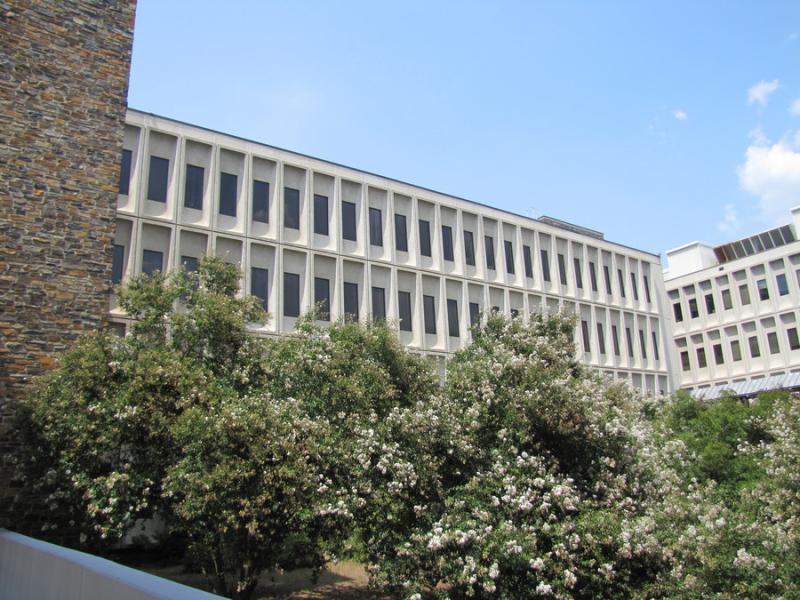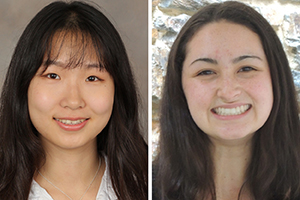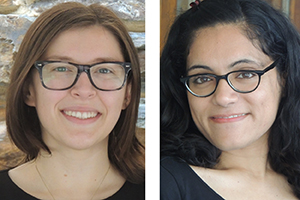
Getting underrepresented high school students excited about a STEM career is important to Dr. Dick Brennan, Chair of Duke’s Biochemistry Department. He also knew many of the PhD students in the Department felt the same. So in 2021, he reached out to Durham’s Emily Krzyzewski Center, otherwise known as the Emily K Center, to ask if some of his students could tutor as part of their Scholars to College program. The Emily K Center is a nonprofit with a variety of programs that build on the academic, career, and leadership potential of academically strong high school students who are traditionally underrepresented in higher education. Specifically, the Scholars to College program starts recruiting in the 8th grade and receives roughly 80 applications for 36 slots. To date, the program has a near 100% college attendance rate and 85% of their 2022 class is hitting their ACT benchmarks.

Aili Hao, a sixth-year biochemistry PhD student, has had success helping her scholar move up one grade level by bringing various aspects of biology together and has encouraged her scholar to consider a future career in science. She carves out one hour a week to tutor her scholar in AP Biology, a fast-paced course that covers a new topic weekly. Aili has plenty of tutoring experience under her belt—she volunteered in high school, while an undergrad at the University of Wisconsin, for Duke’s Biochem 301 class, and now at the Emily K Center. She is trying to support the Durham Community in a meaningful way and says, “Giving one hour a week is not a lot to ask.”
A second-year PhD student, Emily Cannistraci, was the first generation in her family to attend a four-year college and knows the challenges high school students can face when they need guidance on homework and preparing for higher education. She volunteers with Duke F1RST, a network of first-generation alumni who support first-generation, low-income undergrads, and has added tutoring at the Emily K Center. She teaches her scholar freshman algebra. “Working with the Emily K Center has been very rewarding,” she says. “Watching my student learn new concepts helped me gain confidence in my future career goals.” After graduating, Emily plans to teach at a primarily undergraduate institution.

All tutors train before they match. Then volunteers and scholars meet weekly in a monitored Zoom breakout room. Alex Hofler, another second-year PhD student, tutors her scholar in 9th-grade math and typically begins her sessions with a sample problem—explaining her reasoning. If her scholar is comfortable with the subject matter, they move on, if not they continue working through different problems. Alex is impressed that the scholars take the lead on what to cover and for how long. “They come prepared with the material they wish to work through, so they need to be able to identify what they don’t understand—a difficult task for anyone,” says Alex. “Once they identify the source of their confusion, we discuss these topics without wasting time going over things they already understand.”
Akanksha Manghrani, a fourth-year PhD student, just started tutoring her 11th-grade scholar in honors chemistry. Akanksha is passionate about teaching and enjoys explaining difficult concepts in simple terms. She also finds it helps to incorporate chemistry concepts into everyday life and even came up with a sports analogy on the spot. Said Akanksha, “I try to give him the big picture and emphasize the process, intercepting when he’s thinking in the wrong way.” Although she’s only been tutoring for one month, she’s already seen progress in her scholar.
The Emily K Center has built a successful roadmap to help students get to college—leveraging an army of volunteers who help pave the way. Though academics play an outsized role, equally important is building the scholar’s confidence. That’s where the tutors come in—they provide a safe space where scholars can ask questions, learn, and get excited about STEM subjects.